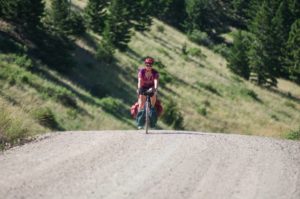A month ago, I left my life on hold back in Madison, Wisconsin to try something I’ve never done before.  We are now at the end of our bike tour across Montana and I’m thinking about what I can do to apply what I’ve learned to my life back home.
We are now at the end of our bike tour across Montana and I’m thinking about what I can do to apply what I’ve learned to my life back home.
Our tour started in Billings, MT and ended in West Glacier National Park. As you can imagine, a lot changes over 700 miles. We went from rugged prairies and vast pastures through huge forested valleys over countless hills to the Rocky Mountain Front and, finally, into the mountains themselves. Biking through all this definitely wasn’t easy. I struggled to keep up most of the time. But as I chugged along in slow gear, I realized that a lot more was changing than just the landscape. Not only was I becoming physically stronger from hauling 85+ pounds, I was also learning a lot and growing internally.
I’m an environmental studies student and a self-proclaimed hippie, so a lot of things we learned weren’t completely life-altering. But the lessons certainly were reinforcing. I can apply a lot of what I’ve learned here in Montana to my life back in Wisconsin. What’s interesting is because this course focuses on Montana and the West, it only counts as an elective back home at UW-Madison. I would argue that a lot of what we covered on this course is applicable in my city, state, and the mid-west in general, and this course has even sparked my interest in learning more about local and state energy policies in Wisconsin. A lot of Environmental Studies classes at UW are either focused on Wisconsin (frac sand mining, native water rights), or very broad and cover international topics (world hunger, deforestation). After taking this course I got a view of a part of my country that I hadn’t seen before, the great West, and I can apply this to my future studies. I now have a perspective that a lot of my fellow students don’t have and I feel lucky to be able to share that.
I can also apply a lot of what I’ve learned to my personal life. I’ve always considered myself a bit of an environmentalist, but I know there’s always more I can do. I bike almost everywhere in Madison, but sometimes I get lazy and drive to work in the rain or snow. After biking through Montana, I know I’m tough enough to handle the Madison hills and variable weather to get groceries and such, so I will definitely bike even more. Another thing I will do is change some of my consumptive habits and encourage my friends to do the same. Although we’ve read about how personal sacrifice doesn’t always wind up doing a great deal of good (“Forget Shorter Showers”), I still think it’s important to do what we can to consume less and model that behavior for others. We’ve also read about how we need more activism and social change, and I believe that has roots in small personal transformation. I’ve learned that it’s important to share my voice, not just with friends and family but with policymakers, too. I am now more prepared to share my voice and opinions with others about environmental issues that matter to me.
After biking so far, it’s time to take a little rest – but not for long. I’ll soon be back on my bike, back in Madison, even back in class before I know it. I will have to let the time pass as it must but I certainly won’t forget all the important lessons I learned on this course, and the amazing people who became my friends along the way.
One Reply to “Anna Tolle: Lessons Learned”
Comments are closed.
I am struck by at least two important points in this post: the role of internal change and the role of personal sacrifice in conservation.
First, the role of personal sacrifice in the face of great environmental concerns. When we ask the question “What difference does a single shorter shower make?” we might be missing the main point. We have allowed our prevailing culture to paint careful resource stewardship as a form of unpleasant sacrifice with all the ensuing negativity which a sacrifice might entail. I suggest we reframe our actions as positive rather than some (negative) denial of some god-given right to thoughtlessly exploit our resources.
As a small example, I use rain barrels to collect runoff to water my large gardens, rather than use valuable drinking water from our aquifer. When I use collected rainwater to water my vegetables, I don’t feel that I am denying myself the convenience of turning on a hose. I consider that I can closely monitor all of the areas of my garden as I water by hand, with a watering can. I can water selectively to prevent weeds, which would be impossible while using a sprinkler to broadcast water everywhere. And because of the time and effort involved, I will never over-water anything! The whole process is simply more rewarding, and it does not feel like I am making a sacrifice of convenience at all.
Superficially it appears that hand-watering is a lot of unnecessary work, but that’s just not true. Digging a 120-foot well and running a coal-fired electric plant to provide the power to operate a submersible pump to water vegetables in a region with adequate (but inconveniently timed) rainfall is where the REAL unnecessary work comes in to play.
My water usage doesn’t impact far away drought-stricken areas, but it impacts me tremendously, and in the end, the personal level is where internal change begins.